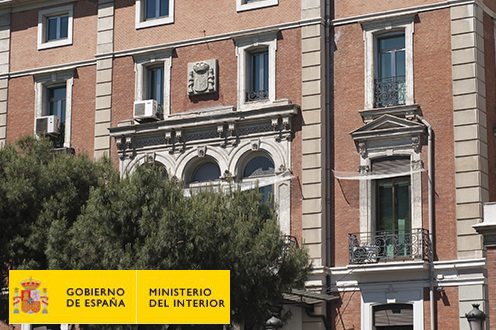Coronavirus COVID 19
Ministry of Home Affairs establishes criteria for action by State law enforcement agencies within framework of Royal Decree declaring state of emergency
News - 2020.3.15
The Order will remain effective during the whole period the Royal Decree remains in force in relation to the State law enforcement agencies, the regional police forces, local police forces and private security firms.
The aim of this Order is "to adapt to the jurisdiction of the Ministry of Home Affairs" the measures contained in the Royal Decree "in relation to the operational actions that the State law enforcement agencies must take on for its implementation".
This contains "common criteria for action", for all the State law enforcement agencies, which must act in a coordinated fashion under the command of the Minister for Home Affairs, with the aim of upholding the measures to control movements, supporting the work of the health authorities, guaranteeing the supply of basic foods and other products, and ensuring the functioning of critical infrastructures.
In order to implement these measures, the Order states that "citizens are under a civic duty to collaborate and not to obstruct the work of police officers in the exercise of their duties", and adds that "any violation or resistance to the orders of the competent authority will be sanctioned pursuant to legal provisions".
All of these measures will be applied "in accordance with the principles of proportionality and need, designed to protect the health and safety of citizens and contain the spread of the disease".
Coordination between different forces
The Royal Decree issued by the government establishes that all State law enforcement agencies, including regional and local authorities, will come under the direct command of the Minister for Home Affairs for "the protection of people, goods and property".
One of the aims of the Order issued by Fernando Grande-Marlaska is precisely "to guarantee concerted action by the State law enforcement agencies, regional and local police forces and private security companies and personnel, to implement and uphold the measures contained in the Royal Decree throughout the country".
He stated in this regard that "collaboration and coordination between the different police forces with jurisdiction at each regional level will be stepped up in all security operations". The Order also establishes "collaboration by private security personnel that provide services at the installations or facilities affected".
To this end, the Ministry of Home Affairs will set up an Operational Coordination Centre "to ensure the permanent and continuous transmission of information to and from law enforcement agencies, whether national, regional or local, both to issue orders and guidelines on action and to receive news and monitor situations as they arise".
Support for health authorities
The Order makes "the capacities of police forces" available to health authorities and professionals "that serve to aid health authorities and professionals in situations in which this aid is necessary so that urgent healthcare can be provided to people who most need it".
In this regard, it states that "police security measures will be strengthened that help guarantee the normal functioning of health centres". This will also apply "in establishments for the preparation, storage and distribution of pharmaceutical and health products".
The ruling also states that "when it is necessary in light of the circumstances, health and emergency services may be backed up when called out".
Freedom of movement
The Royal Decree issued by the government introduces a series of limitations on the freedom of movement of citizens in the streets. The ruling issued by Fernando Grande-Marlaska indicates in this regard that law enforcement agencies "will establish fixed and mobile security controls, both in public roads and areas, and on public transport, particularly in those places and during those times of day that may particularly be affected by the restrictions imposed to ensure that the measures limiting the freedom of movement are observed".
The Order states that "at any event, the actions of the law enforcement agencies will take into account the need to guarantee that citizens can access their workplaces and basic services, should they be necessary, as well as allow the mobility of staff that belong to institutions engaged in the provision of essential services and the supply and distribution of basic goods and services".
Other measures
The Order also addresses other areas of action by the law enforcement agencies in application of the provisions of the Royal Decree issued by the government. Police officers, for example, must provide their support "for the measures designed to guarantee the supply of food, and other goods and services".
It also states, among other features, that "police security measures will be stepped up that guarantee the normal functioning of critical infrastructures".
They will also carry out tasks to "support restrictive measures in relation to commercial activity, the opening of establishments and acts of worship".
The Order also has a section on the protection of the health of police officers. The text states, "Police officers included in the scope of application of this Order, regardless of the law enforcement agency they may belong to, are entitled to effective protection in terms of health and safety at work. At any event, they will observe the recommendations and instructions given by the health authorities from time to time in relation to the prevention of the transmission of coronavirus".
Non official translation





